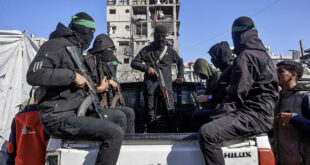BAGHDAD — In mosques, conferences and on the street, some Sunni Arab leaders are rallying members of their once dominant community to join forces and strongly contest upcoming balloting in a bid to find their place in the new Iraq.
Despite recent efforts to unite ranks, however, the Sunni community remains fractured in the post-Saddam Hussein era, raising questions about whether calls to join the political process will succeed.
Sunnis, who form the core of the anti-American insurgency, largely stayed away from Iraq’s landmark January 30 elections, fearing insurgent attacks or heeding boycott calls by rebels and hardline clerics.
Efforts to encourage them to join Iraq’s political process received a boost this month when Adnan Al Dulaimi, spokesman of the General Conference for Sunnis in Iraq, called on Sunnis “to take part in the coming elections†— including an October referendum on a new constitution and a planned general election in December.
Dulaimi said he hoped Sunni clerics who were at the forefront of boycott calls in January would issue a religious edict encouraging their followers to vote.
“We weren’t prepared to enter the political process†in January, Dulaimi said. “Now, Sunni awareness has increased and their will to participate has become stronger.†Dulaimi sent a letter to Iraq’s electoral commission urging it to open registration centres in all the Iraqi provinces before the next balloting and to hold conferences to educate voters, commission official Farid Ayar said.
In January, some registration and voting centres didn’t open in insurgent-infested Sunni provinces after militants threatened election workers.
Ayar said he expected the situation to be better this time “because all Iraqis realised this process will be in their interest.†Dulaimi’s calls come at a time when many Sunni Arabs complain they feel squeezed out by the Shiites and Kurds, who swept to power in the last elections. Shiite and Kurdish politicians have reached out to Sunnis and included them in the Cabinet and the parliamentary committee drafting the constitution in hopes of taking the steam out of the insurgency.
“Boycotting the last elections… deprived the people of opportunities,†said Sheikh Adul Jabbar Qadri, preacher at the Fattah mosque in the largely Sunni town of Beiji. “Now everyone feels this was a mistake and that all Iraqis should participate.†Qadri has been using his weekly Friday sermons to encourage Sunnis to cast ballots. “We also urged them to put their differences aside and to keep away from violence,†he said.
Qadri said a recent meeting in Beiji brought together tribal sheikhs, clerics and local dignitaries to support calls for contesting the votes.
Laith Al Sumaidei, who owns a media production company in Beiji, said his firm was designing posters to encourage a Sunni turnout. One of them shows Iraqis from different ethnic and religious groups holding ballots that read: “Yes to freedom†and “Yes to democracy.†In the largely Sunni city of Samarra, the Iraqi Islamic Party, a major Sunni group, is preparing leaflets that read: “Together toward the elections.†In the last vote, the party withdrew from the race although its name appeared on the ballots.
Ayad Al Samarrai, a senior party official, said that while he believed the Sunni turnout would be higher than last time, violence might still pose a problem in some Sunni areas. He said the party wanted the government to refrain from major military operations and mass arrests that could dampen Sunni enthusiasm to vote.
Already, the calls for taking part in upcoming votes have sparked mixed reactions.
The influential Association of Muslim Scholars says it will not join the political process as long as US and foreign troops remain. Some association members say the group of hardline clerics would not try to stop other Sunnis from voting if they wanted to. Sunni clerics traditionally wield less influence among their followers than do Shiite preachers.
“We’ve seen how the first elections were all lies, so we don’t want to participate in the upcoming one,†declared Adel Suleiman Al Kubaisi, a resident of the largely Sunni western city of Ramadi. “We have been hurt and we’ll hurt even more if we participate because we will give the Americans more legitimacy.†Zuhair Abdullah, another Ramadi resident said none of the elected officials “has given us electricity, freedom or security. They only look out for their own interests. I’ll participate only if there are honourable candidates who care about our interests.†Mohammed Saeed Alwan, who lives in Tarmiyah, north of Baghdad, said he didn’t vote in January but now wants his voice heard.
“I will participate so that we can have a major role in leading the country and so that we can demand the withdrawal of the occupation forces,†he said. “Now the prime minister is a Shiite and he’s asking the Americans to stay. This is not for the good of the country.†Sunni Arab politician Naseer Al Chaderchi said he was worried about divisions among Sunnis that might discourage many from voting.
“There is no unified leadership,†he said. “The former regime has weakened the middle class.â€
 Eurasia Press & News
Eurasia Press & News



